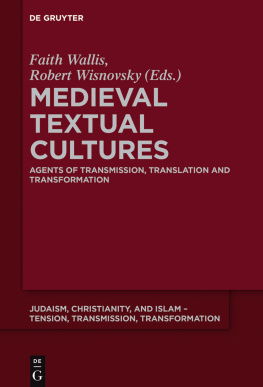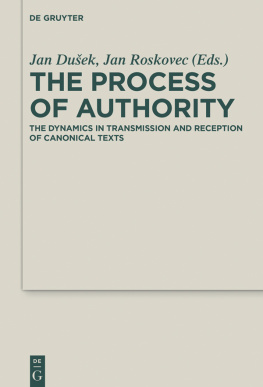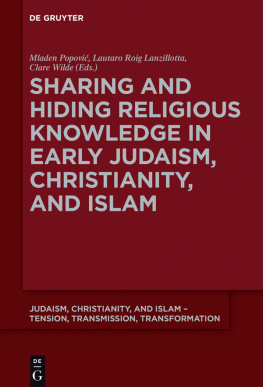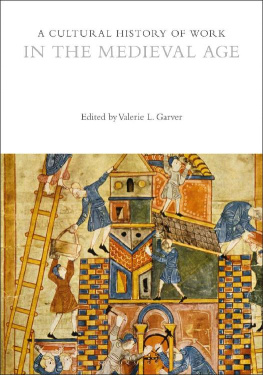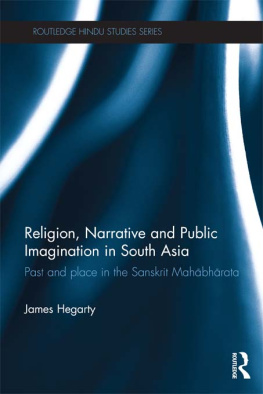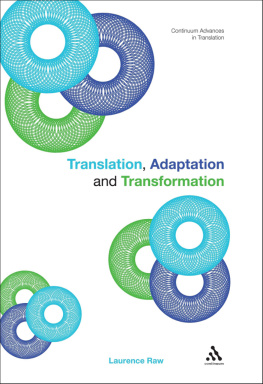Guide

Medieval Textual Cultures
Judaism, Christianity, and Islam Tension, Transmission, Transformation

Edited by Patrice Brodeur, Carlos Fraenkel,
Assaad Elias Kattan, and Georges Tamer
Volume 6

ISBN 978-3-11-046546-4
e-ISBN (PDF) 978-3-11-046730-7
e-ISBN (EPUB) 978-3-11-046570-9
ISSN 2196-405X
Library of Congress Cataloging-in-Publication Data
A CIP catalog record for this book has been applied for at the Library of Congress.
Bibliographic information published by the Deutsche Nationalbibliothek
The Deutsche Nationalbibliothek lists this publication in the Deutsche Nationalbibliografie; detailed bibliographic data are available on the Internet at http://dnb.dnb.de.
2016 Walter de Gruyter GmbH, Berlin/Boston
www.degruyter.com
Acknowledgements
On behalf of the other members of the McGill Research Group Transmission, Translation and Transformation in Medieval Textual Cultures Professors Jamie Fumo, Carlos Fraenkel, Cecily Hilsdale and Jamil Ragep we would like to thank Qubecs Fonds de recherche sur la socit et culture (FQRSC) for their financial support during the period when we were an quipe en fonctionnement. Thanks are also due to Dr Jo Ann Levesque, then head of McGills Office of Research Opportunities, as well as Linda Kemp of McGills Research Grants Office, for their invaluable assistance as we prepared and submitted our funding application to FQRSC. Dr Edwin (Zoli) Filotas was a great help during the first stage of preparing this volume for review. Dr Walter Youngs assistance was especially precious during the formatting and copy-editing of the text; to him we owe a major debt of gratitude.
At De Gruyter, Dr Alissa Jones Nelson expertly shepherded us through the process of review and publication. De Gruyters anonymous reviewer is also owed our thanks, for the thoughtful and positive comments and suggestions that were made on the first draft. Finally, we would like to thank our contributors for their patience as we gathered and edited the final contributions.
Prof. Faith Wallis
Departments of History and Classical Studies,
and of Social Studies of Medicine
McGill University
Prof. Robert Wisnovsky
Institute of Islamic Studies
McGill University
A note on the forms of personal and institutional names
The transliteration of Arabic words and names of historic personages follows the norms of the Encyclopaedia of Islam 3 rd edition (Leiden: Brill, 2007), save where the reference is to the Latin translation and reception of the authors works (e. g.Rhazes instead of al-Rz in the essay by Veit, Azarquiel instead of Ab Isq al-Zarqlluh in the contribution by Comes).
Manuscripts are identified by city, repository, and shelf-mark. The name of the city appears in its English form (e. g. Vienna rather than Wien), but the name of the repository in the language of the country (e. g. Vienna, sterreichische Nationalbibliothek).
The place of publication of printed books appears in its English form (e. g.Naples rather than Napoli).
Faith Wallis and Robert Wisnovsky
Introduction: Agents of Transmission, Translation and Transformation
The McGill University Research Group on Transmission, Translation and Transformation in Medieval Textual Cultures (TTT) is a collaborative enterprise involving historians of medieval culture, literature and art. The working hypothesis of the research group was that medieval textual cultures, regardless of the particular discipline or the specific civilization under review, can best be understood as products of dynamic processes of transmission, translation and transformation.What was transmitted, translated and transformed was the legacy of the civilizations that emerged around the Mediterranean in the last two millennia BCE, particularly in Greece, Rome and the Near East. More specifically, our project stressed the importance of the interchange of ancient legacies for understanding medieval textual cultures (transmission and translation), by recognizing that reception is a creative cultural act (transformation). This approach also evaded any temptation to reduce medieval textual cultures to mere receptacles of the ancient legacies. Placing the accent on the creative aspect of reception avoids two paradigms that in the past have shaped the perception of medieval intellectual history. First, in terms of transmission across time , the paradigm of the survival/ revival of the classical tradition yields to an approach which emphasizes the agency of learned communities in creating and naturalizing this tradition. Secondly, in terms of transmission between sibling cultures , we could set aside an instrumentalist view that reduced the historic role of Islam to that of preserving and relaying ancient learning to Europe. Not only is Islams creative development of ancient concepts better appreciated now, but the complex interaction between these Islamic reformulations and medieval Christian and Jewish textual cultures, each equipped with its own acquired practices of selection and transformation, is changing the way in which this process is understood. We hope to contribute to this new understanding.
The main methodological implication of our approach is that the centrality of transmission, translation and transformation to medieval textual cultures can and Agents of Transmission, Translation and Transformation (2010). The present volume is the fruit of the second workshop.
The goal of the 2010 workshop was to build upon the what questions addressed in our Vehicles workshop of 2007 specifically, the question of What were the scholarly and literary vehicles by which the shared cultural forms inherited from antiquity were transmitted, translated and transformed? In the second workshop, we focused on the people, relationships, societies and institutions who were doing the transmitting, translating, and transforming, in an effort to answer the question, How did these agents propel the processes of transmission, translation and transformation? The transition from vehicles to agents proved to be more complex than we had initially envisioned. The papers presented at the Agents workshop, and the discussions that ensued, made it clear that not every agent acted with an agenda . And even in those cases where an agenda could be identified, that agenda was sometimes motivated by immediate needs, or by religious and moral factors, that were compelling to the actors, but that are more opaque to us. Some particularly pertinent methodological issues surfaced: for example, what exactly do we mean when we say that a text becomes available for transmission or translation? And why do some texts, once transmitted, fail to thrive in their new milieu? In other words, should we expand the notion of agency to account for a decision to discard some transmitted texts? In light of our ultimate ambition to re-frame the history of medieval textualities, the second workshop was a turning point, moving us towards a more sophisticated framework of the ecology of transmission where not only individuals and teams of individuals, but also social spaces and local cultures, served as agents who shape these textualities.
The TTT team was initially reluctant to adopt the theme of agents because it seemed impossible to arrive at a definition of agency that was both clear and specifically applicable to transmission, translation and transformation in medieval cultures. In the end, we agreed to give the idea a chance, even without an agreed definition. Our aim was modest: to assemble a provisional tool-kit of concepts and models of agency that would help us to understand something (if not everything) about processes taking place in different cultural settings in the medieval period. From that pragmatic standpoint, etymology, while not as satisfactory as definition, could at least give us a conceptual rope to grasp as we ventured into the unknown.

